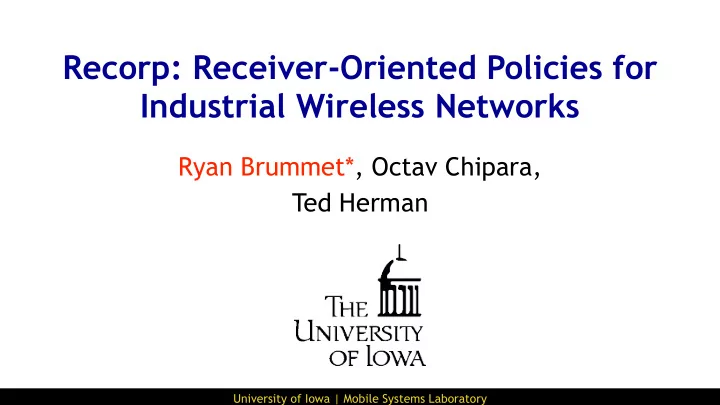

Recorp: Receiver-Oriented Policies for Industrial Wireless Networks Ryan Brummet*, Octav Chipara, Ted Herman University of Iowa | Mobile Systems Laboratory
Industrial Wireless Networks • Applications – process control systems • Workload – stable periodic flows – known period, deadline, and phase • Strict performance requirements – predictability – high reliability plantengineering.com – real-time University of Iowa | Mobile Systems Laboratory 2
Challenges: Network Dynamics • Moving machinery • Outdoor environments Tesla Automation • Moving workers Ford Motor Company Automation.com University of Iowa | Mobile Systems Laboratory 3
TSCH Schedules A B C • Time Slotted Channel Hopping – time division multiple access with channel hopping Slot 0 1 2 3 – predictable – centralized F 0 : AB F 1 : CB CH 0 • Limited Flexibility F 0 : AB CH 1 – overprovisioned retransmissions to handle link variability F 1 : CB CH 2 University of Iowa | Mobile Systems Laboratory 4
TSCH Schedules • State of the art – sacrifice predictability for flexibility – examples – (1) slot stealing – (2) hybrid TDMA with CSMA – (3) low likelihood transmissions in the same slot • Can we do better? University of Iowa | Mobile Systems Laboratory 5
Key Insight Allow transmissions to be reallocated conditioned on the local state at runtime University of Iowa | Mobile Systems Laboratory 6
Key Insight • Coordinator initiates transmissions A B C – coordinator pulls for packets – packet transmitted upon pull reception Slot 0 1 2 3 • Transmissions selected via local state – selections prioritized via a priority F 0 : AB F 1 : CB CH 0 ordered service list of transmissions F 0 : AB CH 1 F 1 : CB • Offline synthesis F 0 : AB – coordinators and service lists ensure CH 2 F 1 : CB reliable packet delivery University of Iowa | Mobile Systems Laboratory 7
Run-Time Adaptation • Schedule • Recorp policy – packets dropped in two traces – no packets dropped F 0 : AB F 0 : AB F 0 : AB F 0 : AB F 1 : CB F 1 : CB F 0 : AB F 1 : CB Spec Spec F 1 : CB F 1 : CB Slot 0 1 2 3 Slot 0 1 2 3 F 0 : AB F 1 : CB F 0 : AB F 1 : CB Trace 1 Trace 1 —— —— —— —— F 0 : AB F 0 : AB F 1 : CB F 0 : AB F 0 : AB F 0 : AB F 1 : CB Trace 2 Trace 2 —— F 1 : CB F 1 : CB F 1 : CB F 0 : AB F 0 : AB Trace 3 Trace 3 —— —— —— University of Iowa | Mobile Systems Laboratory 8
Recorp Design O ffl ine synthesis Pull operations (§3.B.1) (§3.B.2) Workload Current Routes Policy Evaluator Policy Builder state Min. Link Quality Policy Unschedulable Runtime adaptation (§3.A) University of Iowa | Mobile Systems Laboratory 9
Evaluation • Simulation • Comparison – 41 nodes, 1 base station – schedules – 50 flows – flow centric policies (FCP) – 3 flow periods – 3 different workload scenarios – 100 runs – ensure 99% end-to-end reliability • Measurement • Workload Scenarios – real-time capacity – collection (COL) – relative to schedule performance – dissemination (DIS) – route through the base station (RTB) University of Iowa | Mobile Systems Laboratory 10
Real-Time Capacity University of Iowa | Mobile Systems Laboratory 11
Conclusion • Recorp policies – distribute retransmissions at run-time in response to network dynamics – utilize local adaptation to distribute allocated transmissions • Significant performance improvement compared to state-of-the-art – 1.63 to 2.44 times median increase in real-time capacity • For more details please see our paper University of Iowa | Mobile Systems Laboratory 12
Worst-Case Response Time University of Iowa | Mobile Systems Laboratory 13
State Example Slot 2 Slot 3 Slot 0 Slot 1 PL A (F 0 ) PL A (F 0 ,F 1 ) PL A (F 0 ,F 1 ) PL A (F 1 ) 2 3 Pf Pf f F 0 : F F 0 : F F 1 : F F 1 : F f S 0 S 0 Pf f s s F 0 : F 2 3 +Pf 4 F 1 : F 2PsPf s f 3PsPf 3PsPf 1 S 0 f F 0 : F F 0 : S F 0 : S F 0 : F f F 1 : F F 1 : F F 1 : F F 1 : F Ps f S 0 S 1 S 1 S 0 s F 0 : S s s F 1 : F 2 2 +2Ps 2Pf 2 +2Ps 2Pf+3Ps 2Pf 2 +PsPf 3 S 1 Ps Ps Ps s 1 1 F 0 : S F 0 : S F 0 : F F 1 : S F 1 : S F 1 : S S 2 S 2 S 3 Release F 0 , F 1 Complete F 0 Complete F 1 University of Iowa | Mobile Systems Laboratory 14
Recommend
More recommend